A safari under the Kenyan sky
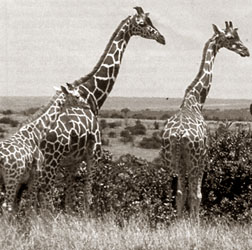 Any story of Africa should begin like the opening scene of the Lion
King with its sky. My first view of the sky came imperceptibly; I had
fallen asleep cradled in my luxury seat with a fuzzy airline blanket
drawn firmly over my freezing feet. Any story of Africa should begin like the opening scene of the Lion
King with its sky. My first view of the sky came imperceptibly; I had
fallen asleep cradled in my luxury seat with a fuzzy airline blanket
drawn firmly over my freezing feet.
Later on I discovered that socks had been provided in the mitty pouch
that Kenya Airways bestowed on us, but I had been too distracted by the
view outside to notice. We flew from Mumbai at three-something in the
morning, a time when the city's harsh lights had been smudged out,
leaving a string of fairy lights winking on the ground.
As we soared above the sea, the golden-yellow flecks in the water
seemed to be reflecting the star-strung night sky - Mumbai harbour, it
appears, has constellation of ships. We were chasing the night as we
flew west, and dawn was breaking as we reached the Kenyan coast.
By air, Kenya is dust brown. Acre after acre of flat, tan, land
extended below, bereft of any green or blue to relieve it. It was hard
to imagine a rabbit hiding underneath, let alone the herds of elephants
I was hoping existed. To the right, the broken nose of a mountain
pointed impartially at the sky as the sky itself, peered coyly from
underneath the clouds.
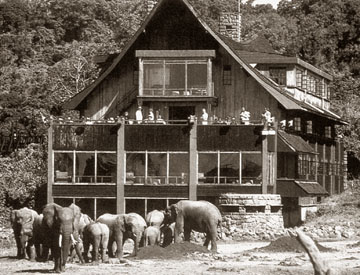 As we descended through the cotton candy barrier to land at the Jomo
Kenyatta International Airport, it lit up in a banner of pink and
saffron, sunlight throwing the air. As I discovered later, it is magical
sunlight: no matter how much of it is poured through the African air,
the wind is always cool. As we descended through the cotton candy barrier to land at the Jomo
Kenyatta International Airport, it lit up in a banner of pink and
saffron, sunlight throwing the air. As I discovered later, it is magical
sunlight: no matter how much of it is poured through the African air,
the wind is always cool.
This we found as we spent one day in the rainbow - bright, bustling
downtown of Nairobi, where sunburn went side by side with sweaters. The
next morning we bundled ourselves up in two well-padded safari vans.
After leaving the city, the car lapped up the road in butter-smooth
miles, passing the occasional village and ubiquitous churches that seem
as common as cornfields in Kenya. Gradually the road wound up, and then
curved abruptly to give us a heart-stopping view of the Great Rift
Valley, which we would be entering.
Cliffs stood ruggedly on either side, miles apart, while between
them, running north to south, was the chasm that the earth had rift some
millions of years ago, part of a geological fault line that ran all the
way up to Siberia. Dusty trees stretched indolently in the sunny grass,
the air seemed to have an ancient purity as it cradled the land under a
blinding blue sky. We were in Africa.
The Polka-dot Plains
Somewhere after the fifth hour driving, the heavy tar, high-duty road
narrowed itself into a ribbon of bumpy, packed dirt, cutting through the
golden grasslands. By this time, we were sprawled negligently about the
van, listlessly eyeing the savannah and the occasional roadside
villages.
Little boys in India wave at trains, little boys in Africa wave at
safari vans. In the background there were clumps of cattle, scattered
like so many coffee beans, with a lone, red-cloaked Masai herdsman
standing sentinel, like a stork.
In the foreground, zipping by us as we bounced along, was dry grass,
painted pony, dry grass....waitasec! There, innocuous, unheralded, was
our first encounter in the bush.
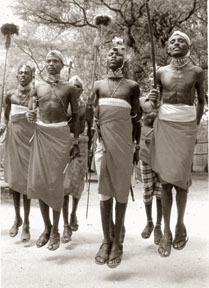 A candy-striped zebra, grazing indifferently by the edge of the road.
We sat up. No more snoozing - the Mara, that golden land of game, was
drawing close. Mara, in Swahili, means spotted. Masai Mara doesn't
translate into 'spotted Masais', however interesting that may sound, but
instead, 'the spotted plains where the Masais live'. A candy-striped zebra, grazing indifferently by the edge of the road.
We sat up. No more snoozing - the Mara, that golden land of game, was
drawing close. Mara, in Swahili, means spotted. Masai Mara doesn't
translate into 'spotted Masais', however interesting that may sound, but
instead, 'the spotted plains where the Masais live'.
It is spotted because the amber grass is flecked by greener, thornier
bushes and tangles of leafy creepers. Every now and again an acacia tree
will pose haughtily against the backdrop of the blood-red sunset.
The palette of a grassland is as sparse as its vegetation; muted,
functional shades of khaki, tan, and olive green, countered occasionally
by the red of the naked soil, or the emerald of the grass near a stream.
But streams are rare; we would have to drive more than two hours across
the park to reach the river, so my chances of seeing a hippo seemed
slim.
I will now be plugging the Sarova Mara, so if anyone thinks that my
opinion will be biased - because I got to stay there for free - should
skip ahead. Because I am about to tell you that the place is the perfect
locale to compliment the wild experience.
Giant tents built on individual wooden decks, with canvas windows
that zip down. The bathroom is tiled and walled, enough comforts, minus
any creatures, to keep the most fastidious of travellers satisfied. As
for me, the only disappointment was that I wouldn't have to shake my
boots out in the morning to get rid of the odd scorpion. For those who
want to rough it, Kenya does far too good a job of pampering you.
After lunch, we set off for the evening game drive. Our genial,
dry-witted, driver-guide David, had lifted the roof hatch; now we were
standing and bumping our shoulders and hips against the sides, as the
wind blew my cap off. The sky blushed pink in anticipation. Undulating
grassland stretched before us, every bush the potential harbour of some
spotted, sought-after animal. Ah... now we are out in the wild.
There... leaping fifty yards to the right was a... Thomson's gazelle,
polished ebony black and cocoa brown, as sinuous as any Thai dancer. And
over there, just beyond those bushes was an entire herd of.... zebras.
Oh! And over to the left, that thing moving in the grass, that was.... a
Thomson's gazelle. Right next to the zebras. Hm.
How quickly one becomes blase about a Thomson's gazelle.
Sharp-eyed and focused, we refused to let the teeming masses of
herbivores distract us. We were looking for the Big Five. We were
looking for kills, for chases, for cats crouched for the catch. We were
looking... at a herd of safari vans.
Our van, the eighth or ninth to drive up, joined the crowd. There was
no sound except for the hushed whirring of fifty cameras, and the
occasional beep of a particularly sophisticated electronic recording
device.
And there, in the wilderness, in the midst of the African grass and
the African vans and the hydra heads of tourists craning out, were
cheetahs. Two of them - brothers, David told us, because, like an
African version of Sholay, females only enter the picture during mating
time.
Cheetahs are the supermodels on the safari circuit, lean and
luxurious and sensuous as all hell. This pair was no exception, as they
catwalked straight through the tangle of parked cars, never deigning to
look at the lowly creatures gawking at them.
More nervous were the dainty pair of jackals that are often found in
the cheetah's wake; nervously melting into the under-brush, their ears
perked as jackrabbits. Cheetahs, check. Jackals, added bonus. Next, we
moved on to meet the elephants. By the end of the evening, we were
jubilant. We had seen two prides of lionesses, one with cubs, and both
black-maned, and golden lions.
We had eased out of the path of a solitary black rhino, and loped
alongside the dappled giraffes. Numerous species of grass-eaters,
including the Santa-bearded wildebeests and the gravid Wild Buffalo had
turned from or towards our vehicles.
Bragging rights secured, we turned to the camp. Stuffed after a tasty
buffet, we sat around a fire, and cracked jokes about a small, tailless
deer called the dik dik.
The next morning's game drive introduced us to a grumpy hyena who
scowled when we made him move from the road, a pair of adolescent lions
who practised pouncing when they weren't chasing their mother's tail,
and a baby elephant whose ears flapped drunkenly as he staggered
underneath his towering guardians. Still no leopard, so we plunged into
the pool and waited for the evening ride.
Mile after mile of bronzed grasses swayed to the hoof beats of the
gazelles and antelopes, and, near a clump of trees, giraffes lowered
their heads to peer at us like psychedelic construction cranes. On the
two-way radio, David heard that a leopard had been spotted on a tree. By
the time we reached there, we were one out of over 20 vans, parked
perilously close to the bush that the leopard had disappeared into. We
settled down to wait.
After around a quarter of an hour, a headless gazelle wandered by. We
all began entertaining bloodthirsty visions of a lovely, gory kill, but
the deer walked away, unmolested.
And then, inch by breathless inch, a large, powerfully blunt head
began snaking from the bush. It was the leopard, who, never lifting his
belly more than two inches above the ground, managed to slink away with
such speed and grace that we were left gaping in his wake. Half a dozen
vans immediately roared to life and gave chase like the discovery
channel version of paparazzi, but he had melted into the grass, and the
land seemed as austerely empty as the ruby-red sunset sky.
The Strawberry Lake
The next morning we drove to Nakuru National Park - over 180 square
kilometres of electrically fenced-in forests teeming with everything
except elephants. We drove through the tangled, abundant jungle to reach
our hotel, tucked away in a rock cliff.
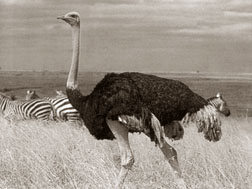 The Sarova Lion Hill Lodge consisted of cottages perched on different
levels of a hill, each room with its own veranda, and the most adorable
mosquito net in existence. Sugar-white nets draped over a polished
wooden frame surrounded the entire bed, turning a macchar-dani in to
four-poster, curtained luxury. The Sarova Lion Hill Lodge consisted of cottages perched on different
levels of a hill, each room with its own veranda, and the most adorable
mosquito net in existence. Sugar-white nets draped over a polished
wooden frame surrounded the entire bed, turning a macchar-dani in to
four-poster, curtained luxury.
As we drove out into the drizzle that had suddenly started falling
from the pearly grey sky, extended families of baboons went about
socialising in the front lawns and on the road, turning their red-romped
backs to us with immense dignity. We were driving towards the lake; on
one side the rock-face rose above us, on the other, the clotted clumps
of acacia trees would occasionally part to give us glimpses of
velvet-coated waterbuck and elands.
Near the lake there was a stretch of soggy bark-brown grass, and
grazing contentedly in the middle was a rhino, a white one this time,
with red billed oxpeckers enjoying their own breakfast on his shoulders.
We wound up our stay with a relaxing sprawl at the Mt. Kenya Safari
Club, the erstwhile watering hole of the glitzy, celebrity spices.
Individual cottages tucked against the murmur of a running stream, with
a sunken jacuzzi-tub in the bathroom, and a crackling log fire in the
hearth.
In the evening, we were told to wear 'smart casuals' although I
rebelliously had my hiking boots under my skirt! We ate dinner in a
polished wooden room, which had man - length elephant tusks framing its
doorway....
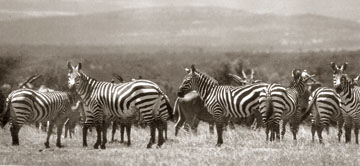 So at five something in the evening as the plane screamed exultantly
down the runway and we lifted off into the majestic dusky sky. I grinned
at the hostess offering me a passion fruit welcome drink. So at five something in the evening as the plane screamed exultantly
down the runway and we lifted off into the majestic dusky sky. I grinned
at the hostess offering me a passion fruit welcome drink.
After a while the parks blur in your memory; you tend to forget the
number of different gazelles you may have seen, and the hotel rooms fade
away to a vague jumble of dessert buffets and springy mattresses. But
the essence of the African sky haunts your conciousness. Its deep,
throbbing spaces pulse with a primeval promise of life. Like the call of
the ocean, it will echo in your heart.
Tell the hippos to wait for me, because I know I'll be coming back.
Go Now
|
